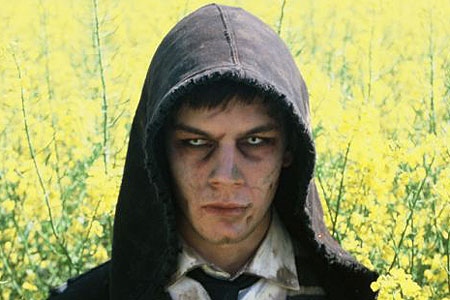 |
|
ARTS |
CULTURE |
|
Mission Newsletter |
|
Review by Diego
Costa In his newest release, Otto; or Up with Dead People, Bruce LaBruce continues negotiating hedonism and political awareness. It has the flair of an impeccable culmination of LaBruce's previously rehearsed themes and recently acquired hefty budgets. All the usual suspects are here - the fetishization of the masculine male body, the political nonsense - but for the first time there is a sensibility and a painterly aestheticizing devoid of cynicism. Its hero, Otto, is as dead as he is nostalgic for a recently lost love. The self-absorbed, chastising filmmaker, Medea, is as interested in starting "the revolution" as she is in keeping her Silent Film of a girlfriend around. The bombs in newsreels seem to say more about the characters' psychic hopelessness than the state of global affairs. And even the inevitable orgy scene holds a sense of peace and reminiscence, as if at least then humans allow themselves to physically surrender, transcending identity categories.
Wearing a progressively bloodier hipster hoodie, a raggedy tie and under-vest, Otto sprouts from the ground of the local cemetery to roam around town eating people's insides, mourning the loss of real love and being Medea's film muse. As a clear sign of LaBruce's career zenith, Otto's mishmash of references to "the resistance" and canonical experimental work - most notably Maya Deren's Meshes of the Afternoon (1943) - feel less "for the sake of namedropping" than rigorous, multi-dimensional fimmaking. The authenticity lives in the sophisticated imbrication between concept and visuals. Never has a LaBruce film exuded such gravitas nor has his attention to color been this fruitful. Stock footage becomes black and white zombie footage that morphs into goo-oozing yellows. It's as if the contrarian college freshman from the Feminist student club had "gone legit," turning the vapid political rant into actual substance. Much of LaBruce's critical agenda is achieved not through his usual voice-over narration, but precise shot composition. The kernel of LaBruce's current preoccupations is condensed in a scene where an old couple drives in the front of their car while Otto, the dead gay zombie, gazes at the camera in his perennial state of catatonia. Whatever is left of the human condition in a post post-modern world seems to be trapped between the freeing power of "the new" and yet it is still conducted by an outdated sense of morality. Otto, in his refusal to be an accomplice to life's ultimate delusional truism - the notion that everyone is actually alive - chooses dead living over fake living. Shedding off the shackles of tamed desire he becomes his own urges. Like the bestial, barely human "hero" of Joao Pedro Rodrigues' O Fantasma (2000), Otto gives up romantic fictions such as being "alive" and being "in love" to execute desire unobstructed, barely differentiating vaginas from open wounds. LaBruce's most striking conceptual accomplishment in Otto is the literalized dialogue between old and new achieved visually between Medea, the castrating filmmaker, and her girlfriend. While Medea inhabits the contemporary digital world, the girlfriend is trapped - and filmed - in a silent film era aesthetics, speaking through intertitles. Film's dead history interacts with what has become of a cinematic ideology of resistance - a revolution that never leaves the bedroom or the act of speech. While LaBruce seems to say that the ultimate key to resistance is refusing any kind of consensus, including the notion that everyone is alive, Otto may be more about the contemporary HIV-infected body than body politic per se. As the psychosomatization of present-day malaise, Otto wonders if a dead man can die again. If he cannot, then it pays off to be dead over being alive in the first place. Like the sex-addict in O Fantasma, Otto ends up in a no man's land, surrounded by desert and garbage, regurgitating his deadness the way an HIV-positive gay man may regurgitate his virus, embracing a "we have nothing to lose" defeatism-cum-pleasurable surrender. I am speaking of the ineffably queer practice of barebacking, or having indiscriminate sex without a condom. Writer Jim Krusoe may have shed light on this issue, which Otto metaphorizes so beautifully, when speaking of why serial killers keep on killing. He has argued that the pleasure behind this compulsion is rooted in the unconscious wish to undo the previous act by repeating it. This may explain why every LaBruce film feels like the same one. In Otto, however, the sameness gains magnum opus status. Trailer: |
(c)2008 - 2016 All contents copyrighted by AcousticLevitation.org. All contributors maintain individual copyrights for their works.
